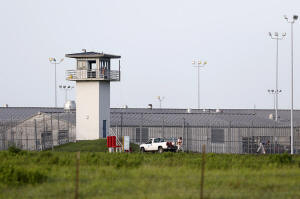Judge says extreme heat in Texas prisons is unconstitutional but doesn't
order they install AC
[March 27, 2025]
By JIM VERTUNO
AUSTIN, Texas (AP) — A federal judge on Wednesday found the extreme heat
in Texas prisons is “plainly unconstitutional,” but declined to order
the state to immediately start installing air conditioning, which could
cost billions.
The judge affirmed claims brought by advocates of people incarcerated in
the state, where summer heat routinely soars above 100 degrees
Fahrenheit (38 degrees Celsius). But they will have to continue pressing
their lawsuit later in a trial.
The lawsuit was initially filed in 2023 by Bernie Tiede, the former
mortician serving a life sentence whose murder case inspired the movie
“Bernie.” Several prisoners’ rights groups then asked to join his legal
fight and expand it.
The lawsuit argues the heat in the state facilities amounts to cruel and
unusual punishment, and seeks to force the state to install air
conditioning.
Jeff Edwards, lead attorney for prisoners and advocates, called the
judge’s order a victory, even if it didn’t require an immediate fix.
“We proved our case,” Edwards said. “The court made it very clear what
the state is doing is unconstitutional and endangering the lives of
those they are supposed to be protecting ... This is step one in
changing the Texas prison system.”
Edwards said advocates will push for relief for prisoners as quickly as
possible. “I’m regretful we can’t protect them with temporary relief
this summer, but we will move as fast as we can,” he said.
Texas has more than than 130,000 people serving time in prisons, more
than any state in the U.S. Only about a third of roughly 100 prison
units are fully air conditioned and the rest have either partial or no
electrical cooling.

“This case concerns the plainly unconstitutional treatment of some of
the most vulnerable, marginalized members of our society,” U.S. District
Judge Robert Pitman wrote in his ruling on a a temporary injunction
request. “The Court is of the view that excessive heat is likely serving
as a form of unconstitutional punishment.”
But the judge said that ordering the state to spend “hundreds of
millions, if not billions, of dollars to install permanent air
conditioning in every (prison),” could not be accomplished before it
expired in 90 days.
It would take months to install temporary air conditioning, and could
even delay a permanent solution, the judge wrote.
Pitman said he expects the case will proceed to trial, where advocates
for prisoners can continue to argue their case.
He also issued a warning to the state that they will likely win at
trial, and that the state could face an order to install air
conditioning.
[to top of second column]
|

An inmate works outdoors during the hot summer outside a Texas
prison unit in Huntsville, Texas, on June 25, 2015. (Rose Baca/The
Dallas Morning News via AP, File)

The judge also noted that the state Legislature, which is in session
through May and writes the two-year state budget, is also
considering bills that would require air conditioning to be
installed in prisons.
But the Republican-majority Legislature has been hearing complaints
about extreme heat in prisons for years and has not addressed the
issue. In 2018, the state was ordered to install air conditioning at
a unit for older prisoners and those that are medically vulnerable.
Officials at the Texas Department of Criminal Justice did not
immediately respond to emails seeking comment.
Texas is not alone in facing lawsuits over dangerously hot prisons.
Cases also have been filed in Louisiana and New Mexico. One filed in
July in Georgia alleged a man died in July 2023 after he was left in
an outdoor cell for hours without water, shade or ice.
A November 2022 study by researchers at Brown, Boston and Harvard
universities found that 13% — or 271 — of the deaths in Texas
prisons without universal AC between 2001 and 2019 may be attributed
to extreme heat. Prisoner advocates say those numbers are only
likely to increase as the state faces more extreme weather and heat
due to climate change.
Last year in a hearing, people who were formerly incarcerated
testified about their experiences in hot prison buildings where they
said temperatures reach above 120 degrees Fahrenheit (48.9 Celsius).
They testified some inmates would splash toilet water on themselves
to cool off, fake suicide attempts to be moved to cooler medical
areas, or even deliberately set fires so that guards would be forced
to hose down cells.
“It’s sad it takes a federal court to come in and change things,”
Edwards said Wednesday. “This is not a Spanish galley in the 1600s,
this is 2025.”
Texas Department of Criminal Justice Director Bryan Collier has
acknowledged that heat was a factor in three deaths from multiple
causes in 2023, and that prison staff and inmates sometimes fall ill
from high temperatures.
But the state disputed the hundreds of deaths in recent years
alleged by the prisoner advocates, and argues Texas has implemented
effective heat mitigation measures, such as providing fans, towels
and access to cooler “respite” areas.
Collier also insisted he would like to have air conditioning
installed across the prison system, but that state lawmakers have
never agreed to spend enough money to do that.
All contents © copyright 2025 Associated Press. All rights reserved |